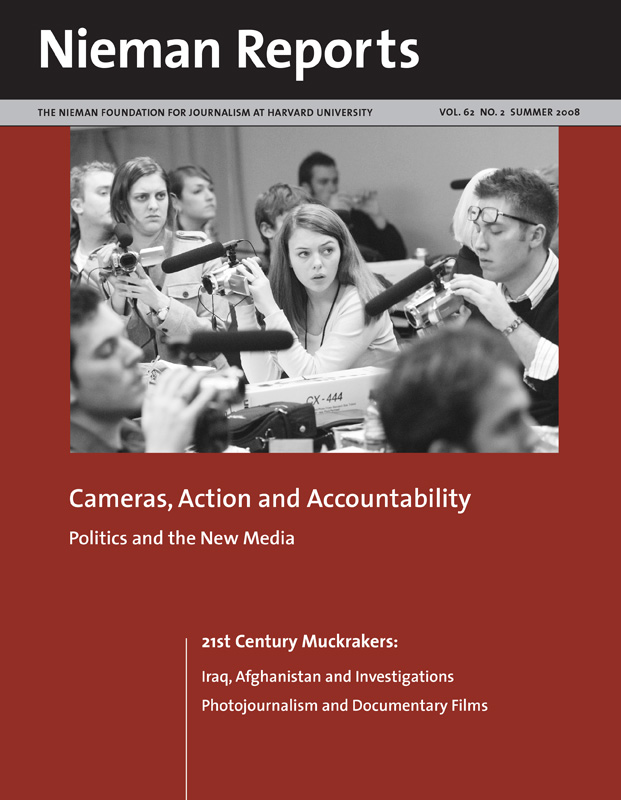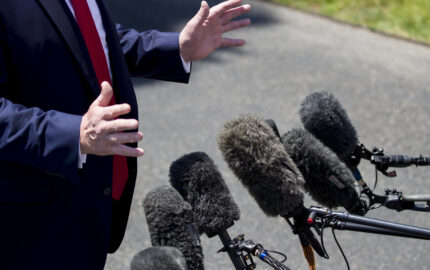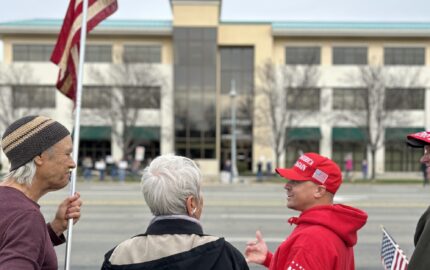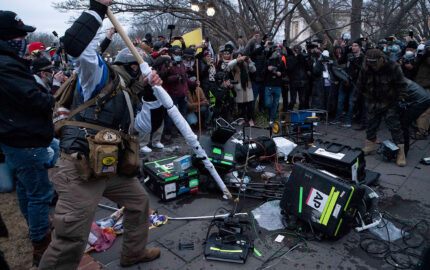In 1995, MIT technology specialist Nicholas Negroponte predicted the emergence of The Daily Me — a newspaper that you design personally, with each component carefully screened and chosen in advance. With the increasing range of communications options, Negroponte's prediction is coming true. With just a few clicks, you can find dozens of Web sites to show you that you are quite right to like what you already like and to think what you already think.
If you want to read essays arguing that your preferred political positions are the right ones, the technology is available to allow you to do exactly that. The world of communications now contains innumerable information cocoons — comfortable spaces in which people can reinforce their own convictions. And to a significant extent in the coverage of politics, members of the media are promoting, rather than counteracting, this trend, which is having a large effect on people's beliefs and attitudes toward those involved in politics and public life.
For politics, the phenomenon is especially important in campaigns. Candidates in the presidential race can construct information cocoons in which readers are deluged with material that is, in their eyes, helpful, supportive and politically correct. Supporters of John McCain can and do construct a Daily Me that includes his campaign's perspective but offers nothing from those with alternative positions — except, perhaps, to cast contempt and ridicule on them.
Of course, self-sorting is nothing new. Long before the Internet, newspapers and magazines were often defined in political terms, and many people would flock to those with congenial points of view. But there is a big difference between a good daily newspaper and a Daily Me, and the difference lies in a dramatic increase in the power to fence in and to fence out information. Most general-interest newspapers, and most responsible editors, include materials that would not be included in any particular Daily Me; they expose people to topics and points of view that they would not have chosen in advance. But as a result of new technologies and increasing options, we live increasingly in an era of enclaves and niches — much of them voluntary — with much of the content in each produced by those who think they know, and often actually do know, what we're likely to like.
Polarizing Points of View
What's wrong with this situation? To answer that question, let us consider an experiment held in Colorado in 2005, designed by Reid Hastie, David Schkade, and me. About 60 Americans were brought together and assembled into a number of groups, each consisting of five or six people. Members of each group were asked to deliberate on three of the most controversial issues of the day. Should states allow same-sex couples to enter into civil unions? Should employers engage in affirmative action by giving a preference to members of traditionally disadvantaged groups? Should the United States sign an international treaty to combat global warming?
As the experiment was designed, the groups consisted of "liberal" and "conservative" enclaves — the former from Boulder, the latter from Colorado Springs. It is widely known that Boulder tends to be liberal, and Colorado Springs tends to be conservative. People were screened to ensure that they generally conformed to these stereotypes. For example, people were asked about Vice President Cheney. Those who liked him were warmly welcomed to the Colorado Springs experiment and cordially excused from the discussions in Boulder.
What was the effect of discussion? In almost every group, people ended up with more extreme positions. The Boulder groups favored an international treaty to control global warming before discussion; they favored it far more strongly afterwards. In Colorado Springs, people were neutral on that treaty before discussion; discussion led them to oppose it strongly. Same-sex unions became much more popular in Boulder and less so in Colorado Springs. Aside from increasing extremism, discussion had an independent effect: it squelched diversity. Before members talked, many groups displayed internal disagreement. Even in people's anonymous post-deliberation statements, that disagreement was much reduced as a result of discussion. Discussion among like-minded people greatly widened the rift between Boulder and Colorado Springs.
To a significant extent, people are learning and passing along 'facts' from narrow niches of people, most often comprised of like-minded others.
In many ways, our Colorado experiment is analogous to what's happening as a result of Web-based communication options today. It is clear that in political campaigns, the sheer number of online outlets makes it exceedingly easy for people to replicate the Colorado experiment, whether or not they are trying to do so. Those who think that the Republican nominee is terrific, and that the Democratic nominee is a liar and a fraud, can easily find supportive material. Many liberals jump from one liberal blog to another, while at the same time many conservatives restrict their reading to points of view that they find congenial.
A central consequence of this kind of self-sorting is what might be called "enclave extremism." This term refers to the fact that when people end up in enclaves of like-minded people, they usually move toward a more extreme point in the direction to which the group's members were originally inclined. Enclave extremism is a special case of the broader phenomenon of group polarization, which has been found in more than a dozen nations. As group polarization occurs, misconceptions and falsehoods can spread like wildfire.
Group polarization is everywhere, but it clearly occurs on the Internet. For example, 80 percent of readers of the liberal blog Daily Kos describe themselves as Democrats and fewer than one percent say they are Republicans. Many popular bloggers link frequently to those who agree with them and to contrary views, if at all, only to ridicule them. To a significant extent, people are learning and passing along "facts" from narrow niches of people, most often comprised of like-minded others.
The Role the Media Play
Unfortunately, some members of the news media contribute to this problem, including some who are recognized as journalists. Not only online but in the print and broadcast media more generally, among those who report and comment on political events, there are some who self-consciously conceive of themselves as being, in some sense, part of a "conservative" or "liberal" outlet. Sometimes the pressure to think in this way is explicit; sometimes it is implicit and subtle. To a significant extent, this tendency helps to create a kind of "enclave politics" in which the basic point is to raise serious doubts about the beliefs and even the motivations of those on the other side. When members of the media help to create enclave politics, they also produce radically different narratives about American life. When journalists produce such narratives, Americans have an even harder time understanding one another across political lines.
To be sure, the new communications options increase self-sorting and the number of niche audiences. And in a free society, much can be said on behalf of both. They can make life a lot more fun; they can even promote democratic self-government, because enclaves are indispensable for incubating new ideas and perspectives that can add a great deal to public debate. But enclave extremism, especially in the midst of a political campaign, produces serious challenges not only for those people who want to know what is "true," but also for the project of self-government.
Today, one crucial responsibility of journalists is to become more aware of their role in creating enclave politics. Such awareness could lead to a reduction in the damaging effects of enclave extremism, so that Americans might come to regard one another's divergent views with mutual respect and even a kind of charity.
Cass R. Sunstein teaches at the University of Chicago, where he is Karl N. Llewellyn Distinguished Service Professor of Jurisprudence at the Law School and the Department of Political Science. He is the author of the book, "Republic.com 2.0," among others.



